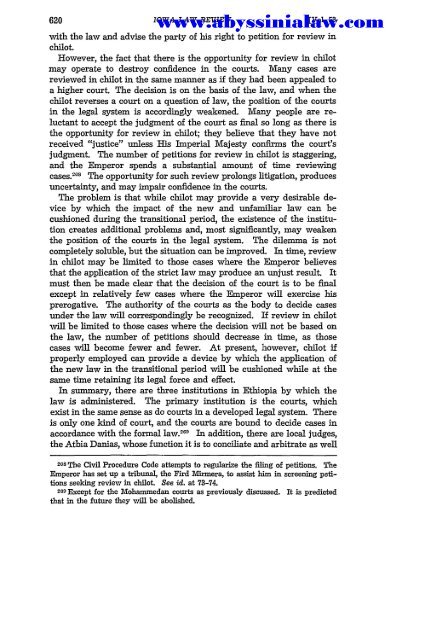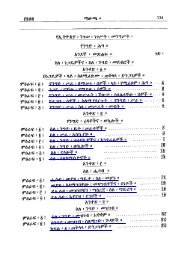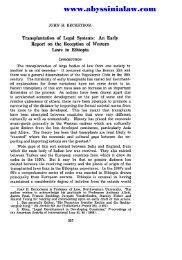Create successful ePaper yourself
Turn your PDF publications into a flip-book with our unique Google optimized e-Paper software.
IOWA LAW REVIEW<br />
with the law and advise the party of his right to petition for review in<br />
chilot.<br />
However, the fact that there is the opportunity for review in chilot<br />
may operate to destroy confidence in the courts. Many cases are<br />
reviewed in chilot in the same manner as if they had been appealed to<br />
a higher court. The decision is on the basis of the law, and when the<br />
chilot reverses a court on a question of law, the position of the courts<br />
in the legal system is accordingly weakened. Many people are reluctant<br />
to accept the judgment of the court as final so long as there is<br />
the opportunity for review in chilot; they believe that they have not<br />
received "justice" unless His Imperial Majesty confirms the court's<br />
judgment. The number of petitions for review in chilot is staggering,<br />
and the Emperor spends a substantial amount of time reviewing<br />
cases. 2 8 The opportunity for such review prolongs litigation, produces<br />
uncertainty, and may impair confidence in the courts.<br />
The problem is that while chilot may provide a very desirable device<br />
by which the impact of the new and unfamiliar law can be<br />
cushioned during the transitional period, the existence of the institution<br />
creates additional problems and, most significantly, may weaken<br />
the position of the courts in the legal system. The dilemma is not<br />
completely soluble, but the situation can be improved. In time, review<br />
in chilot may be limited to those cases where the Emperor believes<br />
that the application of the strict law may produce an unjust result. It<br />
must then be made clear that the decision of the court is to be final<br />
except in relatively few cases where the Emperor will exercise his<br />
prerogative. The authority of the courts as the body to decide cases<br />
under the law will correspondingly be recognized. If review in chilot<br />
will be limited to those cases where the decision will not be based on<br />
the law, the number of petitions should decrease in time, as those<br />
cases will become fewer and fewer. At present, however, chilot if<br />
properly employed can provide a device by which the application of<br />
the new law in the transitional period will be cushioned while at the<br />
same time retaining its legal force and effect.<br />
In summary, there are three institutions in Ethiopia by which the<br />
law is administered. The primary institution is the courts, which<br />
exist in the same sense as do courts in a developed legal system. There<br />
is only one kind of court, and the courts are bound to decide cases in<br />
accordance with the formal law. 269 [Vol. 53<br />
www.abyssinialaw.com<br />
In addition, there are local judges,<br />
the Atbia Danias, whose function it is to conciliate and arbitrate as well<br />
268 The Civil Procedure Code attempts to regularize the filing of petitions. The<br />
Emperor has set up a tribunal, the Fird MVirmera, to assist him in screening petitions<br />
seeking review in chilot. See id. at 73-74.<br />
269 Except for the Mohammedan courts as previously discussed. It is predicted<br />
that in the future they -will be abolished.





